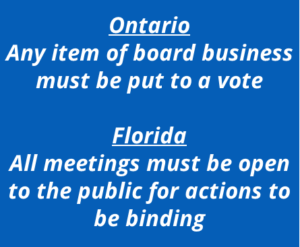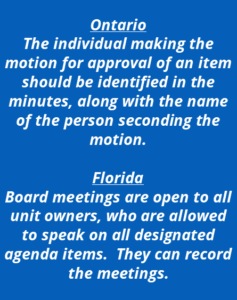 December 2024
December 2024
Anyone owning a condominium in Ontario and a condominium or single-family home in a homeowners’ association (HOA) in Florida has likely noticed differences in how they are managed.
Ontario is focused on legislation, regulations and rules. The low priority given to transparency has created problems that appear unsolvable through rules and regulation.
Condo boards in Ontario have been granted a high degree of authority possibly because they were intended to be self-managed. As buildings grow and regulations become more complex, this is increasingly difficult. Most communities of more than a handful of units opt to employ condominium management on a part- or full-time basis.
Board and Annual General Meetings
The Condo Act requires that any item of board business be put to a vote. The individual making the motion for approval of an item should be identified in the minutes, along with the name of the person seconding the motion.

Florida’s Sunshine Law requires that all meetings of any state, county or municipal board in Florida be open to the public. Actions taken at closed meetings are not binding. This applies to any gathering of two or more members of the same board to discuss some matter which will foreseeably come before that board for action, and applies to both condominium corporations and HOAs. This law requires that meetings of the board be open to all unit owners, who are allowed to audio record or videotape the meetings. The law states that unit owners have the right to speak at these meetings on all designated agenda items.
The vote of every director should be recorded in the minutes in both Ontario and Florida. The intent, in both jurisdictions, is to ensure that the board keeps no secrets from owners. Both systems are partially effective.

While Ontario condo boards struggle to achieve quorum, in Florida even fewer show up at most meetings. Those that do show up have a specific reason for doing so and are given an opportunity to speak.
Finding Qualified Director-Candidates
In selecting candidates for election, Florida communities are more likely to establish a nominating committee to actively seek and qualify potential candidates. The Ontario approach is more typically a short notice of the upcoming annual meeting and request for interested candidates to submit their name.
If one were to judge by results, neither Ontario or Florida offers a particularly good system for association governance. At the end of the day, both jurisdictions struggle with inadequate funds to address aging infrastructure requiring more frequent and costly repairs, and ongoing maintenance.
Both jurisdictions could benefit from a blended system. Ontario could benefit from greater transparency and enforcement. Florida could benefit from more concrete regulations.
In the absence of any imminent support from government, condo boards can improve transparency by implementing a few practices.
- Establish an independent nominating committee to seek and qualify potential candidates for serving as a director. Begin the process six months prior to the annual general meeting. End the process with a candidate meeting prior to the election where candidates can speak and owners can ask questions.
- Open board meetings to owners. For personal or private matters go “in camera” by asking everyone to leave before the meeting ends.
- Improve the quality and depth of meeting minutes.







